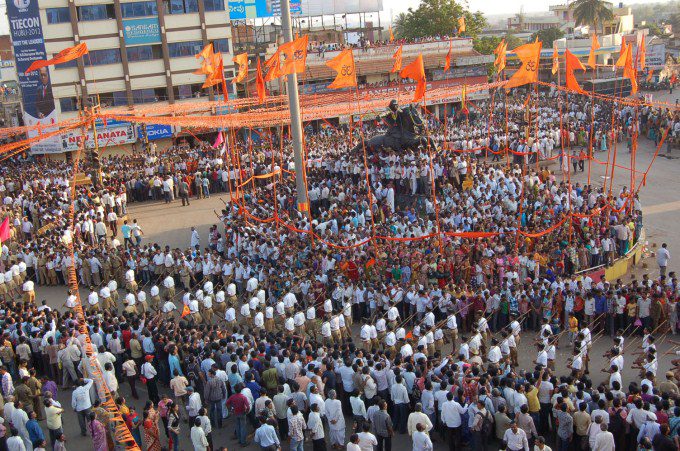Reading Time: 3 minutes
Like Tripura in Karnataka too the RSS has been working hard for last two years and expanded its network to the ward level. They have succeeded in forming a strong army of swayam sevaks. In fact, the campaign is in their hands. The Sangh had organised a massive gathering of Hindus in Tripura last year after sustained work in the state’s remote corners. Here’s a report, for Different Truths.
Lack of sincerity and appetite to defeat the BJP was a factor in Congress meeting its Waterloo in Tripura. Congress must have been aware that the stakes for BJP were quite high in the state, which was why the BJP put its full might to defeat the CPI(M). Congress president Rahul Gandhi must not have overlooked the fact that the RSS had set up its camps in the state, at least two years ahead of the elections to accomplish this task.
A similar situation is also emerging in Karnataka. Realising the intensity of the challenge the RSS has been deploying its swayam sevaks (volunteers) particularly in the rural areas of the state. The BJP has realised that for winning the elections it is not enough to have a strong base in the urban middle class. Instead, the party ought to have a robust reach to the rural people.
Like Tripura in Karnataka too the RSS has been working hard for last two years and expanded its network to the ward level. They have succeeded in forming a strong army of swayam sevaks. In fact, the campaign is in their hands. The Sangh had organised a massive gathering of Hindus in Tripura last year after sustained work in the state’s remote corners.
It must not come as a cataclysm for the Congress if the BJP manages to win the assembly elections in Karnataka. The popularity of Congress chief minister Siddaramaiah has lost much of its shine. No doubt BJP chief ministerial candidate Yeddyurappa symbolised institutionalisation of corruption, but in the present scenario, the people of the state look at it as a matter of the past. For them, it is the present that matters.
The charges of corruption against the present Congress ministers are more relevant for them. They are judging the Congress on the performances of its ministers. Obviously, Siddaramaiah is caught in a piquant situation. Neither he can disown these ministers and leaders, nor present them as the modern face of the party. Rahul Gandhi has used all resources available to him in the Gujarat elections, but in Karnataka, the task to defeat the BJP has been left to Siddaramaiah.
The fact of the matter is the RSS during the last four years of Narendra Modi rule has grown by more than 30 percent. This information was shared with the delegates attending the Akhil Bharatiya Pratinidhi Sabha meeting at the Sangh’s headquarters in Nagpur by the organisation’s joint general secretary, Krishna Gopal. He revealed that Sangh’s “activities are now being held in 95 percent of the geographical mass of India”.
Ever since Modi government came to power, the Sangha has been utilising the situation to expand. It used the craze for the NDA government and especially of Modi to swell. If the annual report is any indicator of the nature of growth and expansion, leaving aside some areas in Nagaland, Mizoram, and Kashmir, it now holds a record 58,976 shakhas or daily gatherings at neighbourhood parks in 37,190 locations in the country. In March 2014, two months before the Modi government came to power, it had 44,982 shakhas at 29,624 locations.
No doubt the expansion has been commendable, but the statistics also indicate that it has not been in conformity with the desire of the RSS leaders. By March 2015, the figure had leaped to 51,332 shakhas at 33,223 locations. In March 2016, it was 56,859 at 36,867 locations and last March, 57,165 at 36,729 locations. The Sangh leadership is vertically divided on this issue.
While a section describes it as a significant gain, the rivals claim it symbolises slowness. The leaders close to Modi in a hushed tone say that the attitude and approach of Modi were not properly encashed by the Sangh in its expansion mission. Just before the Pratinidhi Sabha speculation was afloat that joint general secretary DattatreyaHosabale, close to Modi, could be elected general secretary to effect a generational shift. But Suresh Bhaiyyaji Joshi was re-elected for a fourth term. Little doubt he was rewarded for the Sangh’s growth under his command. The general secretary is the second-most powerful Sangh official after the Sarsanghachalak.
What has been a matter of interest is just after his re-election Bhaiyyaji made it abundantly clear that the organisation did not approve of incidents like vandalising or pulling down statues or attack on churches and labelled those engaged in such acts as “anti-social elements”. This statement is quite noteworthy, it has come just at a time when the Modi government has come under attack from the secular forces for patronising and promoting the Talibani culture.
Arun Srivastava
©IPA Service
Photo from the Internet














